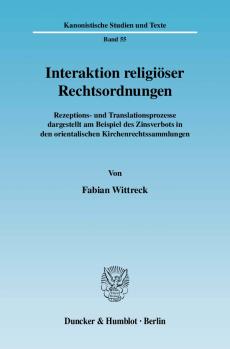Interaction of Religious Legal Systems

In the current debate, religious legal systems exclusively carry connotations of conflict; the question of how the German legal system should correctly interact with Islamic Sharia is only one prominent example. On the basis of the canon law of the Eastern National Churches, Fabian Wittreck demonstrates that religious rights can learn from each other, and how. Armenians, Copts as well as Eastern and Western Syrians perpetuated their traditional legal systems during the centuries under Islamic rule and thus include set pieces of Islamic and Jewish religious law, as well as elements of Aristotelian philosophy; the existing sources of the canon law of the imperial church or of Roman legal provenance are thus overlaid and modified.
Concrete subjects of investigation are the rules on the prohibition of interest or usury, which are comprehensively depicted and analyzed for the first time in the context of the Eastern Church Law. They can be used to demonstrate how legal regulatory concepts, approaches to justification, and also exceptions are adopted across the boundaries of language and religion. At the same time, it becomes clear that the exchange between these religious rights is restricted to the academic and literary level, since many legal texts do not purport to influence Eastern Christians’ legal practices.
Literature: Wittreck, Fabian: Interaktion religiöser Rechtsordnungen. Rezeptions- und Translationsprozesse dargestellt am Beispiel des Zinsverbots in den orientalischen Kirchenrechtssammlungen (Kanonistische Studien und Texte, vol. 55), Berlin: Duncker & Humblot 2009.

